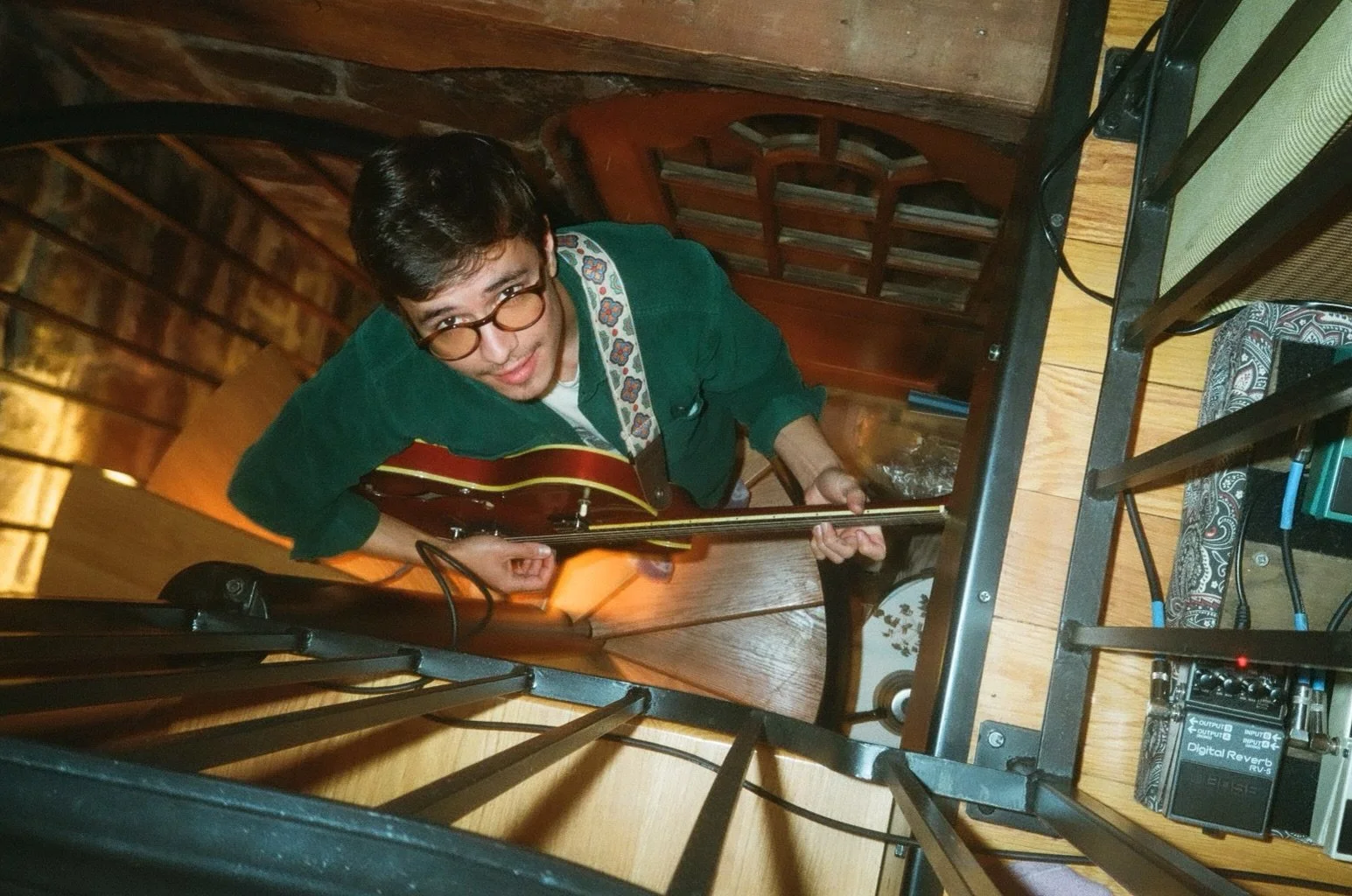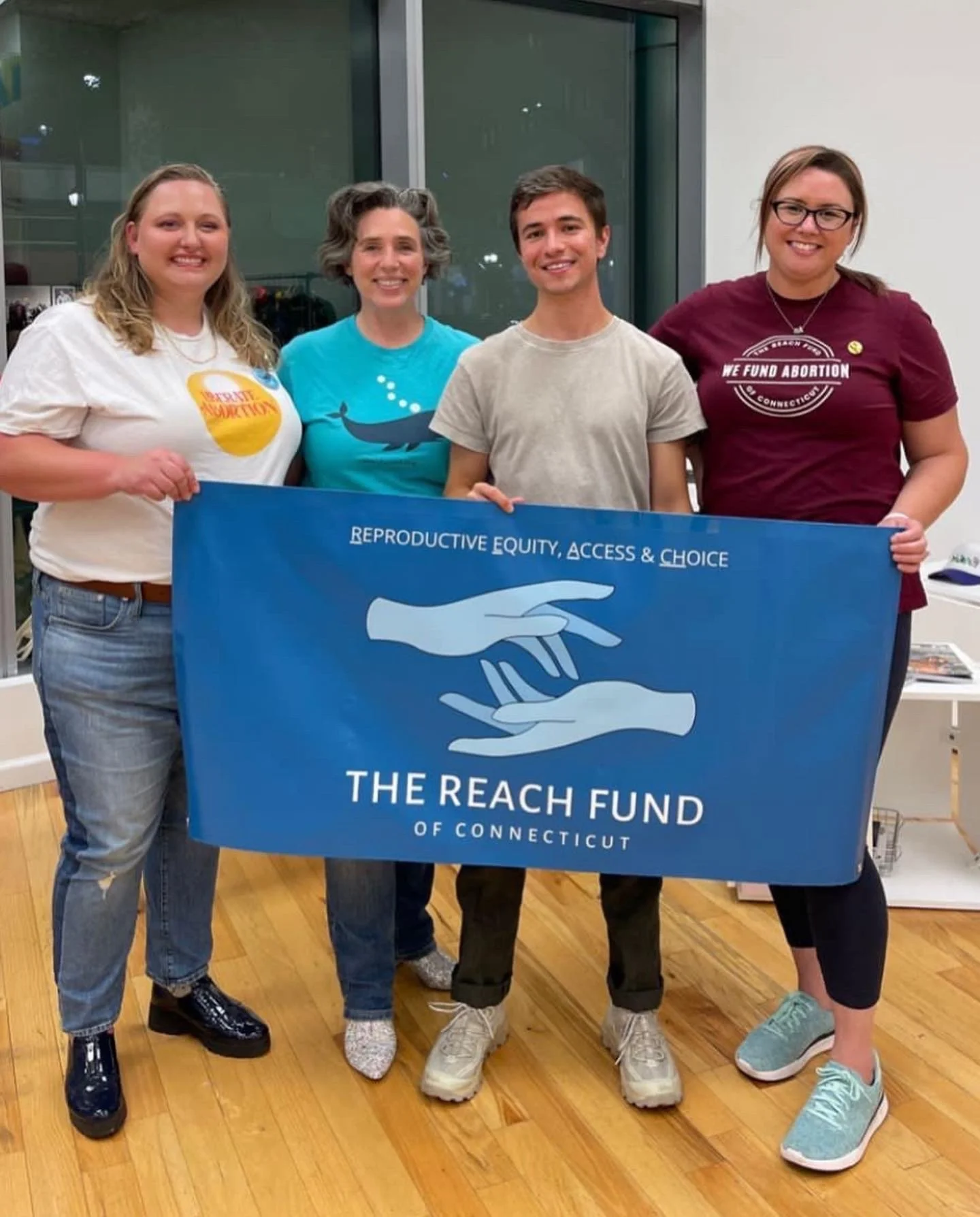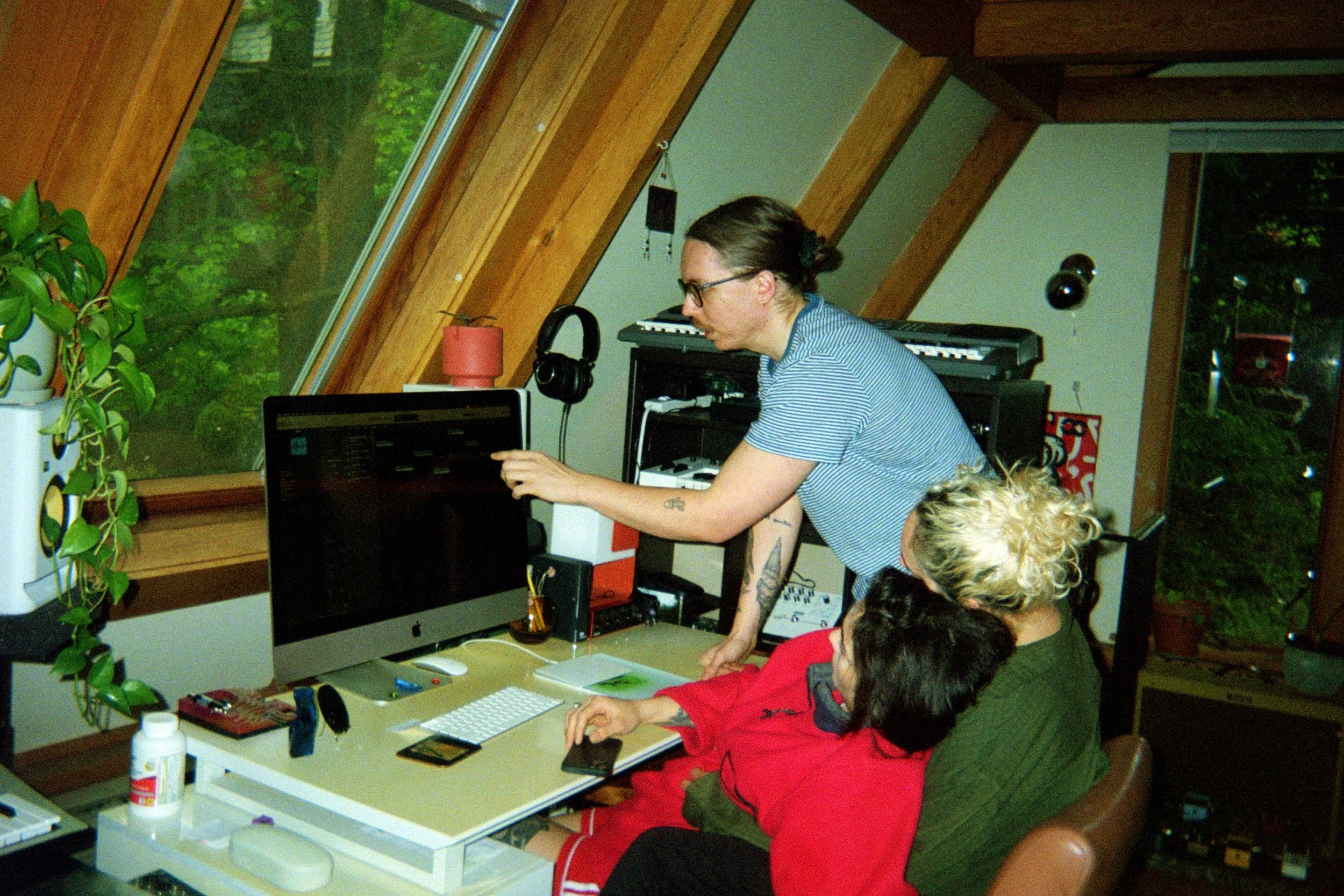FUNNYBONE RECORDS CHAMPIONS AUTHENTIC ARTISTRY
CAFETERIA SITS DOWN WITH FOUNDER DYLAN HEALY TO DISCUSS THE IMPORTANCE OF SUPPORTING LOCAL ARTISTS.
Image courtesy of Clara Huebenthal
Nearly all of us wanted to be rockstars when we were kids, but growing up in Connecticut, the path to musical stardom feels pretty narrow. While our state has a rich history of art and culture, there are not enough stages that shine a spotlight on today’s local artists. If you’re musically inclined, it can often feel as though you have no choice but to leave your hometown to pursue your passion and compete with hundreds of thousands of bright eyed hopefuls just for your 15 minutes.
Funnybone Records is working to change that. Founded by Dylan Healy in 2017, the homegrown record label strives to champion unique artists, while creating an exciting and engaging culture in which both artists and listeners can thrive. Funnybone is driven by the vision of a vibrant local ecosystem in which queer artists are celebrated for being their most authentic selves and encouraged to experiment with joyful abandon. “The vision that I share with my peers is for Hartford to be a city that protects and supports its residents. Not only our basic needs, but our aspirations and goals as well. It's my hope as a local label to be able to participate in the creation of cultural infrastructure. We want to support and generate creativity in the city,” Dylan shares. More than just a record label, Funnybone Records is a gift, providing audiophiles and the sonically sensible with a sense of community and belonging.
Continue scrolling to read the full interview below.
Image courtesy of Emma Trejo
Cafeteria: What inspired you to start Funnybone Records?
Dylan Healy: In 2016, I interned at a label that I absolutely love called Ba Da Bing Records in Brooklyn where I got to witness firsthand what a small, but very mighty team can accomplish. Around the same time, I was starting to get my experience in the music world through concert booking, college radio, collaborating with different musicians, writing for music blogs and just getting a sense of what I liked. While I was connecting with different local musicians, I started to get the sense that there weren't a ton of platforms to truly spotlight the talent in the Hartford area. In 2017, we had CT Scramble and the New Haven Independent, which were doing a great job of covering local scenes, but I just wasn't really aware of that many Hartford based platforms that were spotlighting folks in the way that a label truly does.
After a few years of experimenting in different parts of the music industry, I felt this fire to start a record label. My goal was to support Hartford's arts, music and literature circles by helping artists thrive locally and reach audiences worldwide. I definitely wanted to create an environment where artists could be their most authentic selves and create in a way without any pressure from a label telling them how to be or how to create, which a lot of labels unfortunately do. Eight years later, Funnybone Record is this big, beautiful web. It's very humbling to be working with so many amazing and wildly talented artists from all over the world, some of whom have been with us since day one, like Figurine, Ym, Samuel Sandoval, Daniel Carr, Mild Monk and more. They create such life affirming and genre-defying music that the whole world should be hearing.
Is there a meaning behind the name Funnybone Records?
DH: When you hit your funny bone, your body reacts whether you like it or not. Music has a similar effect on the body. It can evoke a reaction when you love or dislike a song, like when you hear your favorite song from middle school and you still know every word. I wanted to have a name that captured the immediate, innate reaction that music has on nearly all of us. It's also a soft homage to my uncle who is a Hartford-based visual artist. He, unknowingly, is a very formative figure to my creative upbringing.
Image courtesy of Denis Semenyaka
What is it about music production that you love? Can you describe your creative process?
DH: One of the great joys in my life is the privilege of connecting with others through music, no matter the context. I'm convinced that music will connect people together until the end of time. When it comes to producing a recording, there's something so exalting to me about creating something meaningful out of thin air and capturing an otherwise ephemeral moment. It doesn't matter if that's with a microphone, a voice memo app or a shitty tape recorder. The act of recording feels such a sacred practice and something that almost feels supernatural — an alchemy of some sorts. I absolutely revere the entire album creation process from start to finish, though it feels never-ending. I get the greatest joy from working with artists through those journeys, from being texted demos at 2am to the day the album’s released.
My creative process is so fluid for better and for worse; I think it has no fixed shape or volume. It constantly keeps me buzzing in a state of improvisation and stream of consciousness until the pieces fall into place. I'm mostly self taught, but I've found that my greatest teachers are my friends, my collaborators and the leaders in the field around me. I give so much credit to the folks at Blind Moose Studios, as well as friends like Nancy Conforti, Justin Holden, Joshua Jenkins and Taylor Pelella for their many years of inspiring me and contributing to the label’s identity and mission, whether they realize it or not.
I find that my process boils down to four outcomes, which is either something you can hear, something you can hold, something that immerses you or something that connects you with others. I find that every project is iterative and teaches me how to do things better and with greater impact— whether through recording, design, live event production or developing album campaigns.
Image courtesy of Denis Semenyaka
Hartford has such a deep and rich musical history that is marred by the city’s socioeconomic shortcomings. What value does having a locally owned record label and studio add to the community?
DH: The vision that I share with my peers is for Hartford to be a city that protects and supports its residents. Not only our basic needs, but our aspirations and goals as well. There seem to be so many barriers from the top down. As a result, residents have to take it upon themselves to nurture each other from the ground up. It's really a part of the label’s mission to have the music support the work being done. For example, nearly every year I produce a benefit compilation featuring a lot of different artists, based in Hartford and beyond, to raise funds to support initiatives from different nonprofits whose focus is community healing. Those have included the REACH Fund and Hartford Communities That Care. Beyond that, it's my hope as a local label to be able to participate in the creation of cultural infrastructure. I see a lot of collaborators in our area doing that so well, folks like 30Ash, Pressing Plant, Connecticunt, On & On Radio, and Cafeteria as well. They’re making the effort to nurture talent and circulate opportunities in order to document Hartford's artistic blueprint. These are all ways that we're investing in the city’s ecosystem and are helping generate this ripple effect of excitement. We want to support and generate creativity in the city as well as this sense of belonging.
Image courtesy by REACH Fund
Funnybone not only functions as a record label, but you also create opportunities to connect through concerts, listening rooms and DJ nights. Why is it important for a community to have third spaces that are more than just transactional places of business and are actually integrated and accessible to the community?
DH: We're always looking for third spaces. We need them. They feel so rare in this state for some reason, but they are so vital to any city’s ecosystem. Creative third spaces are where art, culture and music become lived experiences because it's not just about consuming the music. It's about being present and sharing space with others — a place where you feel like you can belong somewhere. Whether it's listening rooms or DJ nights or secret shows, they give audiences and artists places to connect and experiment, as well as share their work in meaningful and memorable ways. To even have a quiet, warm place to exist around others and connect is a gift. We’re rolling out a creative-social series soon called Open Circle to do exactly that.
Accessibility is so central to these types of spaces; lowering any financial, physical or social barriers definitely ensures that people are able to participate in any way they like, whether it be as a fly on the wall or as a social butterfly.
Sometimes, it's hard for me to know where to go. I tend to find myself circulating the same few coffee shops and bars to see friends and familiar faces, and it’s not that I value quantity over quality—the third spaces we do have are so special. However, it is notable how few third spaces we have locally. It can feel like there's a direct relationship between the way the city and landlords can sometimes combat our goal of having an abundance of those spaces that we need (i.e. the sudden closure of the venue I co-ran, Wherehouse). Over time, third spaces can help local culture thrive and can be woven into the fabric of our everyday lives. Those are things that should never be gate kept.
Can you speak to the importance of amplifying queer artists?
Amplifying queer and trans artists is absolutely essential to Funnybone’s core. With a roster whose majority of artists identify as queer, the fabric of community doesn't exist without them. The label strives every day to be a safe space for queer and trans artists, as well as listeners. We want to amplify their visibility in order to increase access to platforms, stages and audiences, while also trying to help combat the systemic marginalization and correct historic patterns of exclusion and underpayment. Supporting queer artists isn’t optional for the label — it’s innate and crucial to its existence.
Image courtesy of Dylan Healy
What advice would you give to someone trying to break into music production?
DH: One of the biggest things I hear from people who are used to making music by themselves is that collaboration scares them. I get it — the music making process is always vulnerable. No matter how many years you've been doing it, it's always going to feel pretty vulnerable. I must quote one of my favorite musicians, Adrianne Lenker. When I took a workshop with her, she reminded everybody that we call it “playing music” for a reason, because it is a form of play. It's meant to be fun, it's meant to be weird. It's meant to just be a form of experimentation, where there’s no such thing as right or wrong.
I always recommend that people try different forms of collaboration because the most unexpected results come from it. You only exponentially increase the amount of opportunities or happy accidents that can happen when you're sitting across from somebody. It’s important to embrace community over competition. You learn by doing, by being resourceful and experimenting in ways that might not make sense. Be weird, just be yourself.
How would someone qualify to join Funnybone Records as an artist?
The main criteria is you just can't be a jerk. That's it. People usually just reach out and say hi and talk a little bit about their project or their vision for a future project, and we'll take it from there and just see if the stars align. It's usually a pretty potent mutual feeling if our creative energy is aligned. Making music that is authentic to yourself is the type of music that I want to support.
Image courtesy of Denis Semenyaka








